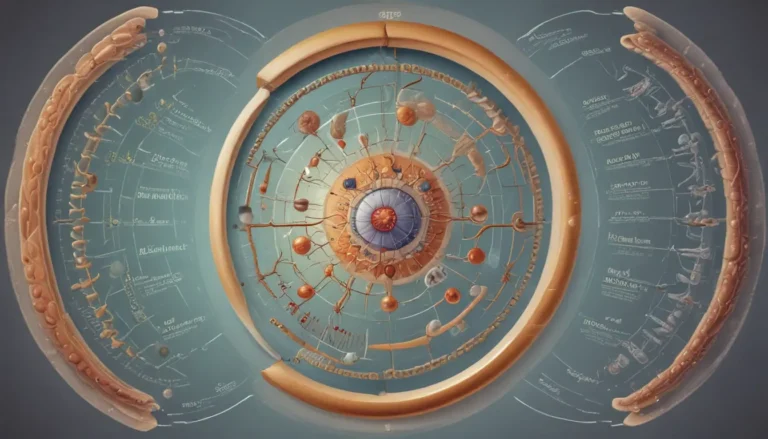A Note About Images: The images used in our articles are for illustration purposes only and may not exactly match the content. They are meant to engage readers, but the text should be relied upon for accurate information.
Welcome to the fascinating world of endocrine disorders! These complex conditions affect the delicate balance of hormones in our bodies, leading to a wide range of symptoms and health complications. In this article, we will delve into eight intriguing facts about endocrine disorders that shed light on their diversity, impact, and challenges. By understanding these key points, we can better appreciate the importance of early detection and effective management of these conditions.
Understanding Endocrine Disorders
Endocrine disorders disrupt the normal functioning of the endocrine system, which plays a crucial role in producing and regulating hormones in the body. When there is an imbalance or dysfunction in this system, it can lead to various health complications. These disorders can manifest in different forms, affecting specific glands or hormones in the endocrine system.
The Variety of Endocrine Disorders
There are several types of endocrine disorders, each with its own set of symptoms and impacts on overall health. Common examples include diabetes, thyroid disorders, adrenal gland disorders, pituitary gland disorders, and reproductive hormone disorders. Understanding the specific type of disorder is essential for proper diagnosis and treatment.
Symptoms of Hormonal Imbalances
Hormonal imbalances caused by endocrine disorders can present with a wide range of symptoms. These may include fatigue, weight fluctuations, mood swings, changes in appetite, alterations in heart rate and blood pressure, among others. The severity and combination of symptoms depend on the type of disorder and its progression.
Causes of Endocrine Disorders
Endocrine disorders can have both genetic and environmental causes. While some disorders are inherited due to genetic mutations, others may be triggered by factors such as stress, medications, infections, or tumors. It is crucial to consider both genetic predispositions and environmental influences in understanding and managing these conditions.
Treatment Approaches
Treatment for endocrine disorders often involves hormone replacement therapy to restore hormonal balance in the body. This can be achieved through medications, lifestyle modifications, or surgical interventions, depending on the individual’s condition. Seeking early and appropriate treatment is key to managing these disorders effectively.
Potential Health Complications
Individuals with endocrine disorders may be at higher risk of developing other health issues, including cardiovascular disease, osteoporosis, infertility, and certain types of cancer. Proper management and control of the primary endocrine disorder are essential in reducing these associated risks.
Importance of Early Detection
Early detection and diagnosis are critical in managing endocrine disorders effectively. Regular check-ups, hormone level testing, and symptom monitoring can help identify these conditions early on, allowing for timely intervention and treatment. Early detection also plays a significant role in improving long-term outcomes.
Lifestyle Modifications for Management
In addition to medical interventions, adopting a healthy lifestyle can greatly impact the management of endocrine disorders. This includes maintaining a balanced diet, engaging in regular exercise, managing stress levels, and prioritizing sufficient sleep. Lifestyle modifications can complement medical treatment in enhancing overall well-being.
Endocrine disorders are a fascinating and intricate aspect of human health that requires careful attention and understanding. By recognizing the diverse manifestations, causes, and treatment options for these conditions, we can promote better healthcare outcomes and support individuals affected by these disorders. If you suspect you or someone you know may have an endocrine disorder, it is important to consult a healthcare professional for accurate diagnosis and personalized management.
Conclusion: Navigating the World of Endocrine Health
Endocrine disorders can significantly impact our health and well-being, highlighting the importance of hormonal balance in the body. By exploring the intriguing facts about these conditions, we gain valuable insights into their complexity and the need for effective management strategies. Raising awareness, promoting early detection, and seeking appropriate care are vital steps in addressing endocrine disorders and optimizing health outcomes.
FAQs: Your Endocrine Health Questions Answered
-
What is an endocrine disorder?
An endocrine disorder refers to a medical condition that affects the functioning of the endocrine system, disrupting the production and regulation of hormones in the body. -
What are the common symptoms of endocrine disorders?
Common symptoms of endocrine disorders include fatigue, weight changes, mood swings, abnormal hair growth, and menstrual cycle irregularities, among others. -
Are endocrine disorders treatable?
Many endocrine disorders are treatable through various interventions, including medication, hormone replacement therapy, lifestyle modifications, and surgery, depending on the specific condition. -
Are endocrine disorders hereditary?
While some endocrine disorders have a genetic component and can be inherited, others may develop due to environmental factors or other causes that are not hereditary. -
Can lifestyle factors contribute to the development of endocrine disorders?
Yes, lifestyle factors such as diet, physical activity level, stress management, and exposure to toxins can influence the development of endocrine disorders. Maintaining a healthy lifestyle is crucial for prevention and management. -
When should I seek medical attention for a possible endocrine disorder?
If you experience persistent or concerning symptoms related to hormonal imbalances or other endocrine-related issues, it is advisable to consult with a healthcare professional for proper evaluation and diagnosis. -
Can endocrine disorders affect both men and women?
Yes, endocrine disorders can affect individuals of all genders, though specific disorders may have different impacts on men and women due to variations in hormone profiles and reproductive systems. -
Can stress contribute to the development of endocrine disorders?
Chronic stress can disrupt hormonal balance and potentially contribute to the development of endocrine disorders. Managing stress through various techniques and seeking support is crucial for maintaining endocrine health.
Explore the vast realm of endocrine health and discover how hormones impact your body’s functions. Delve into the intricacies of these conditions, learn about common disorders like diabetes, and empower yourself with knowledge to manage endocrine disorders effectively.
Was this information helpful? Our dedication to providing trustworthy and engaging content ensures that each fact is thoroughly reviewed for accuracy and credibility. Join us in our mission to deliver informative and reliable insights on endocrine health, empowering individuals to take control of their well-being through awareness and education. Trust in our commitment to quality as you embark on your journey to understanding and managing endocrine disorders.






